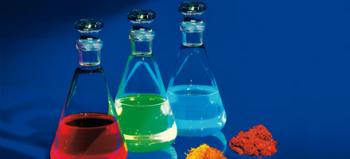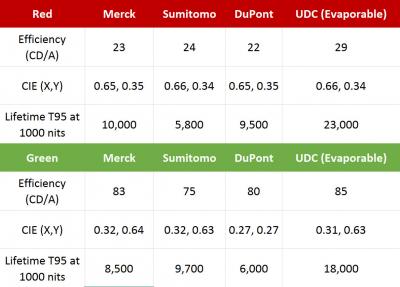The EU launches a €4 million project to develop efficient hyperfluorescence TADF OLED emitters
The EU launched a new project called HyperOLED with an aim to develop materials and matching device architectures for high-performance, hyperfluorescence TADF OLED emitters. HyperOLED is coordinated by Merck, and the project partners include MicroOLED and the Fraunhofer IOF institute. This three years project received a €4 million grant from the EU.

These OLED emitters will be realized by combining TADF molecular hosts with novel shielded fluorescence emitters, targeting saturated blue emission of very high efficiency at high brightness. The project will also achieve efficiency gains through molecular alignment to enhance light outcoupling.
Digitimes: Samsung and LG aim to reduce their reliance on foreign organic material producers
Digitimes Researcher states that currently Samsung Display and LG Display both rely on imported organic materials used in OLED production, but the two Korean makers aim to decrease this reliance. Both companies are buying stakes in companies outside of Korea (for example Samsung's Novaled acquisition and Sun Fine Chem investment) in order to obtain patents and move production in house, mostly at LG Chem and Samsung SDI.

The polyimide used as a substrate in flexible OLEDs, for example, is produced by Japanese Ube Industries - and used by both LG and samsung. Several organic materials used in the OLED stack are produced by Universal Display (PHOLED emitters), Idemitsu Kosan, Dow Chemical and Merck. Both companies use glass mostly from Corning and high-temperature thin film for the back-end processing from 3M.
Merck and Idemitsu Kosan agree to cross-license their OLED patents
Merck and Idemitsu Kosan have entered into a collaboration agreement that allows each company to use the other company's OLED material-related IP in certain areas. Both Merck and Idemitsu hope that this will enable both companies to develop higher-performance OLED materials.

Merck and Idemitsu also expect to continue discussions and expand the collaboration to other areas in the future.
Merck's €30 Million OLED materials production plant in Darmstadt is now online
In June 2015, Merck began to construct a new 30 Million Euro OLED materials production plant in Darmstadt, Germany. Merck announced that the new production plant is now operational, and it provides a fivefold increase in the company's OLED materials production capacity.

Merck aims to become one of the leading suppliers of OLED materials by 2018. The company believes that OLED has the potential to become the technology of the future for displays and lighting.
UDC's evaporable emitters still outperform the best soluble materials
A few weeks ago we posted about Merck's soluble OLED material performance, and today we have some more data from the OLED Association. In the table below you can see how Merck's, Sumitomo and DuPont's soluble materials compare to UDC's evaporable OLED's materials.

As you can see, for the red material, evaporable OLEDs have a clear lead in lifetime and efficiency. For the green material that efficiency gap has pretty much closed, while the lifetime of the evaporable materials are still about double than the best soluble materials.
Merck reveals the efficiency and lifetime of their red and green soluble phosphorescent emitters
In January 2013, Merck said that the performance gap between soluble and evaporable OLED emitters is closed - at least in the lab. Earlier this month at the OLED World Summit the company revealed the development results of their phosphorescent materials, comparing them to UDC's materials (as published on UDC's website).

Merck's red emitter features an efficiency of 19.1cd/A, a lifetime (L90) of 5,900 hours and the CIE is (0.66, 0.34). UDC's red material features an efficiency of 29 cd/A and a lifetime of 23,000 hours. Merck's green material features an of 76.4cd/A, a lifetime of 5,200 hours, and the CIE is (0.32, 0.63). UDCs green features an efficiency of 85 cd/A and lifetime of 18,000 hours, The CIE is similar (0.31, 0.63).
UBI explains their views of the OLED TV industry, gives bullish OLED market forecasts
During the OLED World Summit, an analyst from UBI gave an interesting presentation, showing the company's view of the current status of the OLED TV industry, and their OLED market forecasts for upcoming years.

So first of all, we have LG and Samsung. LGD has obviously been successful in launching WOLED OLED TVs, and scaling up to mass production has been achieved. LG is also hopeful that solution processing will enable them to produce RGB-structured OLEDs efficiently. LG is collaborating with Merck and Espon on printing technologies.
Merck: Samsung is committed to OLEDs and will return to the OLED TV market by 2017
The Korea Times posted an interesting interview with Brian Daniels, senior VP from Merck's performance materials-advanced technologies division. Brian says that Samsung is committed to OLED panels - and will return to the OLED TV market by 2017.

Merck says that improvement in OLED materials will enable cost reductions which will enable OLED TVs to reach large production volumes in three years.
Merck begins to construct a €30 Million OLED materials production plant in Darmstadt
Merck announced it has began to construct a new 30 Million Euro ($34 million) OLED production plant in Darmstadt, Germany. This plant will produce high-purity OLED materials for display and lighting systems. Production will begin in the 2,000 square-meter building in July 2016.

Merck hopes that the new plant will help it become a leading supplier of OLED materials by 2018, as the company believes that OLED will take a significant share of the display market, and Merck plans to become a total solution provider and not just a material maker. The company is developing soluble OLED materials in collaboration with Seiko Epson.
Merck's OLED chief: I'm sure Samsung will soon start producing OLED TVs
 The Korea Times posted an interesting interview with Merck's OLED unit VP, Dr. Udo Heider. Udo is 'pretty confident' that Samsung will soon start producing OLED TVs again.
The Korea Times posted an interesting interview with Merck's OLED unit VP, Dr. Udo Heider. Udo is 'pretty confident' that Samsung will soon start producing OLED TVs again.
In the past few weeks we heard several conflicting reports on Samsung's OLED TV program. Some say they will abandon OLEDs completely (and go for QLED TVs instead), while other reports say that Samsung will soon re-enter the OLED TV market. Last year Merck stated that Quantum Dot based TVs, unlike OLEDs, are no game changer.
Pagination
- Previous page
- Page 4
- Next page

